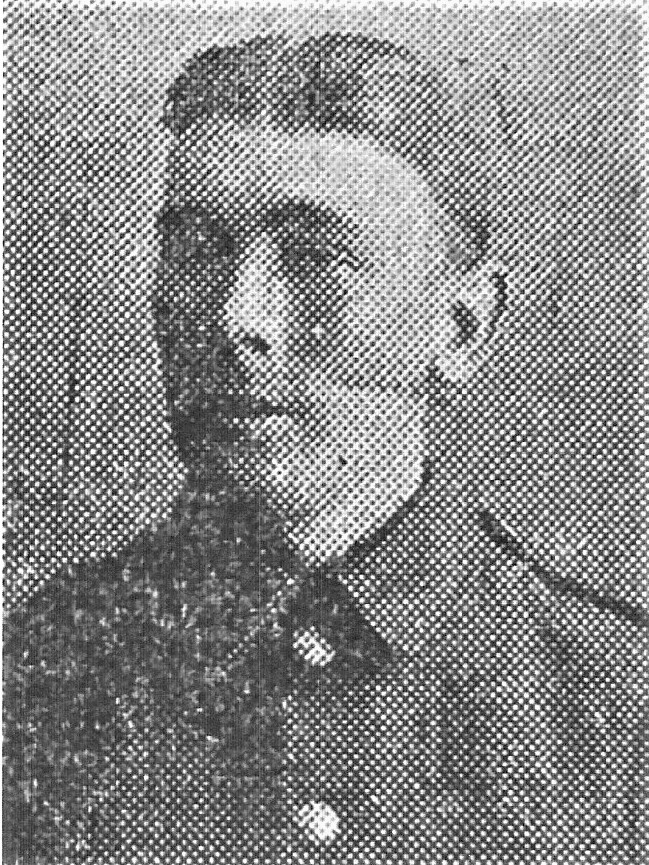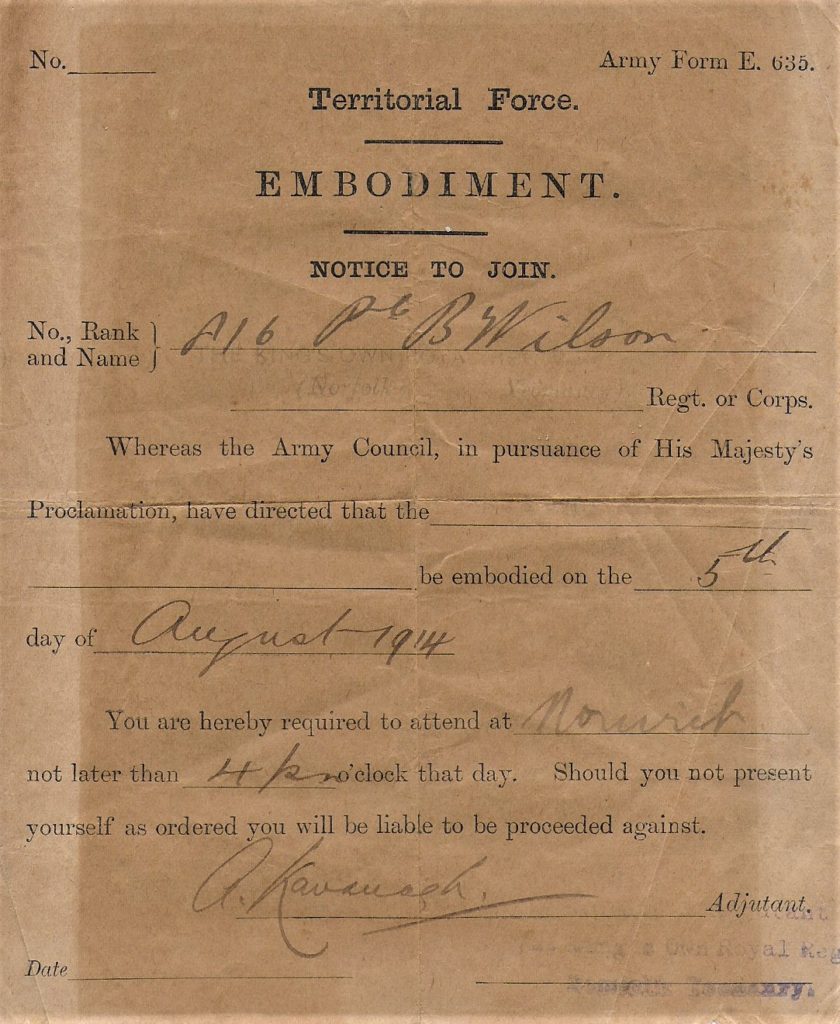1459 SERGEANT WILLIAM WARD
‘A’ COMPANY 4TH BATTALION SUFFOLK REGIMENT T.F.
WHO DIED OF WOUNDS
1ST AUGUST 1916
AGE 22 YEARS
Yet another young Halesworth Territorial to lose his life during the Great War was William Ward, who died of pneumonia following an operation to his abdomen after he had suffered serious wounds. William, known by his family as Willie, was born in the town during the first quarter of 1893, the second of six children from the marriage of William senior, a maltster, and his wife Elizabeth (née Marjoram) who had been known by all as Lissie. From his early years the family had lived in Westhall Road on the outskirts of Halesworth, from where, on leaving school in 1907, Willie found employment with Mr Cecil Goodwin and his brother Clifford at Bon Marche Drapery and Furnishing Store, located at 59, Thoroughfare. Originally, he was employed as an errand boy. He remained with Mr Goodwin until being mobilised for war in August 1914. It may well have been while working for the brothers that he was recruited, in November 1911, to serve in the town’s ‘F’ Company of the Territorials, as at that time Clifford his employer was serving in the company as a Sergeant. Clifford must have been held in high regard, as prior to the formation of the Territorial Force in 1908, he had been serving, since 1895, with their predecessors, the old 1st Volunteer Battalion, Suffolk Regiment.
In December 1899 Clifford was one of several local members of the Halesworth Company who had stepped forward following an appeal for men serving in the Volunteer Rifle Corps to travel out to South Africa to assist the regular army 1st Battalion the Suffolk Regiment in their fight against the Boers. Eventually, after medical checks, Clifford, now in the rank of Lance Corporal, together with Privates Albert Lee and Oswald Hill, had been selected to join the Volunteer Company, with Lance Corporal John Parker to follow them sometime later. The Halesworth Times newspaper of 16th January 1900 had reported on a farewell supper held in the Angel Hotel by members of the Company to wish their comrades ‘God Speed’ as they travelled out to Africa, where they went on to give valuable service. A little over a year later, in June 1901, they had all returned to a hero’s reception. Having served in a theatre of war, they would have all been considered as men who had proved the critics of the Volunteer Force wrong in their opinions as to the value of part-time soldiers. After Willie joined the Territorials and possibly under the tutelage of Clifford, now serving as the Company’s Colour Sergeant, he progressed very well for in September 1913 it was reported that he had won a shooting prize of 10s 0d (50p) with an above average score at the ‘F’ Company’s annual marksmanship competition, held at the Southwold rifle range.
A few days prior to the outbreak of war in August 1914, Willie, with other members of the 4th Battalion, Suffolk Regiment, had arrived in Great Yarmouth at the beginning of their annual two-week training camp. Within a day they were transported back to their home towns to await mobilisation. The order had been received at the Halesworth ‘F’ company, located in the Rifle Hall, at midnight on 4th August 1914, with the men from all of the companies that made up the Battalion reporting to the 4th Suffolks’ headquarters in Ipswich the following day, before being despatched to their war station at Felixstowe on the Suffolk coast. Over the coming weeks, as has been described in our stories of the Halesworth Territorials, those men designated as being for ‘Home Service Only’ began the task of preparing defences against a possible invasion of the east coast, while the remainder who had volunteered for ‘Imperial Service’, including Willie, crossed over to France on 8th November 1914, in preparation for taking their place on the field of battle. Unlike many of those from the town who served and gave their lives in the Great War, Willie’s wartime service record can be quite accurately reported thanks to the superb records relating to several of the Territorial soldiers who served with the 4th Suffolks early in the war. These are held in the Suffolk Record Office in Bury St Edmunds. They show that, during their early training and before they entered the front line, young Willie had proved to be a very competent leader of men. Already holding the rank of Lance Corporal, on 18th February 1915 he was promoted to that of a full Corporal. Three weeks later, on 16th March 1915, he attained senor rank by receiving further promotion to the rank of Lance Sergeant. This rapid rise through the rank structure was no doubt caused by the losses suffered by the 4th Suffolks during their first full-scale action, when they fought as a complete battalion during the Battle of Neuve Chapelle in March 1915, where their losses amounting to in excess of two hundred and ten men of all ranks either killed or wounded. Just a little over a month later, on 24th April 1915, he received further advancement to the substantive rank of Sergeant at the comparatively young age of twenty-two years. Although no doubt happy with the added responsibility, for which he would have been paid, he then had to leave his Halesworth chums now serving in the new ‘C’ double company. He was transferred to the Battalion’s ‘A’ Company which, pre-war, had been made up of men from Ipswich. During the following months the 4th Suffolks continued to serve both in and out of the front line, with Willie continuing to impress his officers as, on 22nd November 1915, he was granted ten days home leave. On his return to the Battalion he was directed to the area close to the small hamlet of Raimbert where the 4th suffolks would have remained during the Christmas period. Early in the new year of 1916, Willie, with his comrades, had been moved once more closer to the northern French mining town of Vermelles. There, on the morning of 19th January, while occupying a length of the front line, the Germans exploded an underground mine under the Suffolks’ positions. This killed eight men. It had also become a tactic of the Germans that, immediately after a mine blast, they would launch a barrage of rifle grenades to either side of the mine crater in the hope of catching men rushing to help their injured comrades. It is highly likely that it was then that Willie received grenade wounds to his left thigh and back. After being transported along the casualty evacuation chain on 20th January, he was admitted to the 2nd Canadian General Hospital located at Le Treport on the French coast. There followed a period at the Convalesant Depot at Rouen, where he would have recovered from his wounds before being discharged to the Base Depot on 4th April 1916. Whilst there, he would have been brought to full fitness prior to being posted back to the 4th Suffolks where he arrived on 5th July 1916. It was just nine days later that his battalion became involved on the fringes of the battle of Bazentia Ridge. Just two days later Willie received the wounds that he would eventually die from, on 1st August 1916, while being treated at the No.36 Casualty Clearing Station. In a notice published in the Halesworth Times newspaper in which his father announced his son’s death, William senior reported that Willie had been laid to rest in the Heilly Military Cemetery, France, with the burial service conduced by Canon R.A. Adderley, Chaplain to the Forces.
On 30th April 1919 William, while living in Holly Bush Cottage, Broadway, Halesworth, was awarded a weekly pension of 5s 0d (25p) for the loss of his son, followed by the second gratuity payment in September that amounted to a total of £23.12s.1d (£23.60p). He would have also been entitled to claim Willie’s medal entitlement of the 1914 Star Medal Trio with his named bronze memorial plaque and scroll.
The location of these awards is not known.
Almost a year after Willie’s death an In Memoriam Notice appeared in the Halesworth Times of 31st July 1917. It had been entered by his fiancée Annie. Sadly, with no further information as to her surname, she has been difficult to trace. She entered the following verse:-
For King and Country, and all he loved,
He gave his bright young life;
His Heavenly Father called him home,
Free from all care and strife.
Some day I hope to meet him,
Some day I know not when;
I shall clasp his hand in a better land,
Never to part again.
Shown above is a rare original copy (not Williams) of the Army Form E635, that would have been delivered to all of the pre-war members of the Territorial Force which would have directed them to report for war service on the 5th August 1914.


